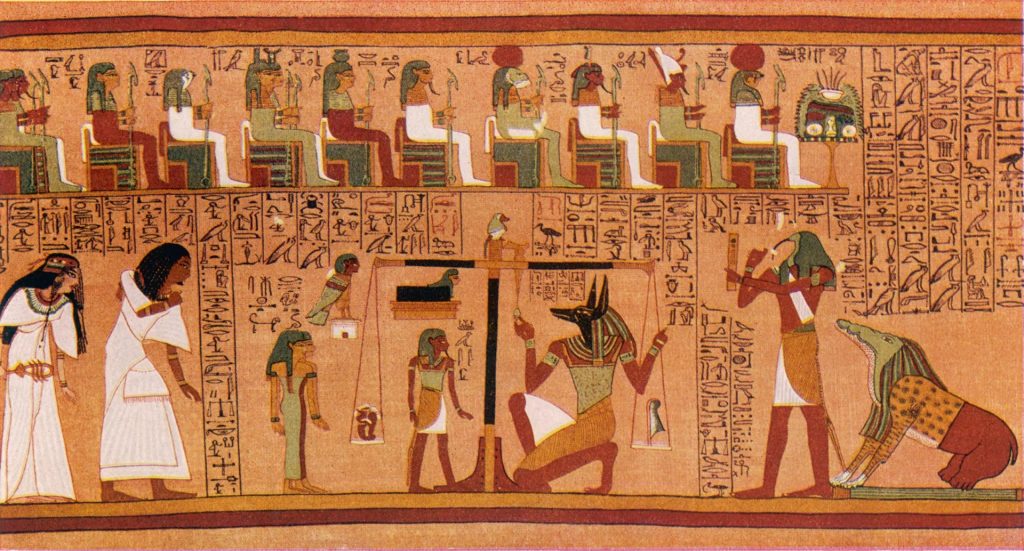
Joel presented his research on the ancient Egyptian Book of the Dead to the Tenth European Conference of Egyptologists in Warsaw
by Adrian Jarvis | Oct 2, 2023 | Uncategorised | 0 comments
Thanks to the AHRC NWCDTP’s Fieldwork and Conference Fund, I was able to attend and present a paper at the Tenth European Conference of Egyptologists organised by IKSIOPAN (the Institute of Mediterranean and Oriental Cultures at the Polish Academy of Sciences). My paper introduced the innovative text-critical methodology that I have developed for analysing the genealogical relationships between surviving copies of spells from the ancient Egyptian Book of the Dead, specifically, those copies dating to between c. 1500 and c. 1000 ʙ.ᴄ. Reconstructing these relationships enables family trees of these copies of spells to be produced, allowing us to see how, over the centuries, scribes gradually altered the texts of the spell, providing insights into the working methods and psychological activity of those scribes.
Since my methodology is quite innovative, combining Greg’s method of textual criticism with a large amount of computer automation and the use of Multidimensional Scaling to verify and hone my results, it was important to get feedback from a wide array of scholars working in the philological wing of Egyptology, who would be in a position to spot any weaknesses in the methodology.
I am delighted to report that my presentation went down very well and attracted favourable feedback across the board. No weaknesses in my methodology were identified, with all the feedback focussing on its strengths. Scholars particularly noted its ability to meaningfully text-critically analyse much shorter Book of the Dead spells than is possible with standard textual criticism and the way in which it takes account of recent critiques directed at the more traditional common-error (so-called ‘Lachmannian’) method of textual criticism and avoids the pitfalls that those critiques identify.
I also had the opportunity to sit on a discussion panel about ancient Egyptian religion and the opportunity to chair a seminar session. Additionally, I was able to enjoy many exciting and stimulating conversations with a large number of Egyptologists over the course of the week, deepening my knowledge of the field and the people who work in it. I also received several offers to collaborate on future projects with some of those Egyptologists.
.
Recent Posts
- Nan Song: Well-being of international students during winter break
- November Blog Post: ‘Need to Know’
- Nan Song: How to Settle in as an International PhD Student
- Excy Hansda: Communicating Research Findings & Networking- Overseas Institutional Visit at the University of Antwerp, Belgium
- Excy Hansda: Navigating Archival Fieldwork in Mumbai: Challenges, Opportunities, and Positionality
Recent Comments
Archives
- December 2025
- November 2025
- October 2025
- August 2025
- July 2025
- April 2025
- March 2025
- February 2025
- November 2024
- September 2024
- July 2024
- June 2024
- March 2024
- December 2023
- November 2023
- October 2023
- September 2023
- May 2023
- January 2023
- December 2022
- October 2022
- July 2022
- June 2022
- May 2022
- February 2022
- January 2022
- December 2021
- September 2021
- August 2021
- July 2021
- April 2021
- December 2020
- November 2020
- July 2020
- June 2020
- May 2020
- April 2020
- March 2020
- February 2020
- August 2018
- June 2018
- May 2018
- April 2018
- January 2018
- November 2017
- October 2017
- September 2017
- August 2017
- July 2017
- June 2017
- May 2017
- March 2017
- February 2017
- January 2017
- November 2016
- October 2016
- July 2016
- June 2016
- May 2016
- April 2016
- March 2016
- February 2016
- January 2016
- November 2015
- October 2015
- September 2015
- July 2015
- June 2015
- May 2015
- April 2015
- March 2015
- February 2015
- January 2015
- December 2014

0 Comments